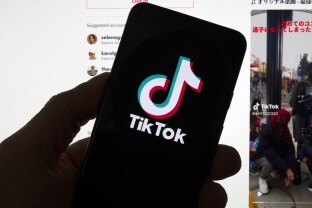The last time the Biden administration and members of Congress got serious about forcing changes to the company that owns TikTok, panic about the potential political consequences of the move was best explained by Commerce Secretary Gina Raimondo.
“The politician in me thinks you’re gonna literally lose every voter under 35, forever,” she told Bloomberg Businessweek last year.
At the time, the bipartisan discussion was about banning the popular social media app in the U.S. That didn’t happen. But now, the bill that aims to force TikTok’s Chinese parent company to sell the app will become law as part of the foreign aid package that passed the Senate on Tuesday night — and politicians will have to explain it to voters.
Americans are deeply divided about what to do with what people like to call “Gen Z’s favorite app.” The new law will give ByteDance, the Chinese company that owns TikTok, up to a year to sell it before a ban is triggered. Proponents say it defies capitalism to believe someone acceptable to U.S. regulators won’t want to buy it well before any ban sets in. But TikTok fans may be alarmed anyway: Earlier this year, users unleashed on lawmakers after the company sent users a push notification claiming Congress was set to ban the app.
Senators said they are ready to explain why the bill isn’t actually going to ban TikTok.
“I just did that with a constituent on my flight up here today, as a matter of fact,” Republican Sen. Thom Tillis of North Carolina said. “We can’t be cowards about this and react to the narrative. Anybody with any business experience knows TikTok has far too much market value to disappear. So it’s a matter of transition of ownership, and that’s all it is.”
Sen. John Kennedy, Republican of Louisiana, said explaining complicated legislation to voters takes a delicate touch. “I would tell them to follow their heart but take their brain with them,” he said. Even though the law wouldn’t force a sale until well into 2025, Kennedy said he expected discussions about the future of TikTok to be a part of the 2024 debate.
On Monday, former President Donald Trump posted a message directed at “especially the young people” on Truth Social. He said President Joe Biden “is responsible for banning TikTok.” Biden does support pushing for ByteDance to sell TikTok — however, Trump did not mention that his own administration tried to ban the app if its owners did not sell. That executive order was stopped by a court ruling.
Lawmakers from both parties are involved in the effort to force change on TikTok. But Democrats are expected to be more vulnerable to backlash from the decision, given that young voters tend to support Democrats and younger people are among the app’s most active users.
So what to tell those TikTok-frenzied young voters now?
“What I’m saying is ‘TikTok ain’t going away,’” said Sen. Tim Kaine, a Democrat of Virginia up for reelection. “[Current owners] are going to have a whole lot of bidders wanting to buy it. And the user experience is going to be indistinguishable except that users’ data won’t be vacuumed by an entity controlled by the CCP.”
“It’ll probably be owned by an American company,” Kaine added. “So who’s against an American company owning it?”
One progressive strategist focused on down-ballot races for Democrats said it was too early to see an impact on campaigns that generally don’t draw a lot of voter attention until late summer. But the TikTok thing “definitely has the potential to be a messaging challenge,” the strategist told NOTUS.
Transparency could be one way around that, said Democratic Sen. Laphonza Butler of California. The congressional action was spurred in part by the intelligence community, which has warned that TikTok, in its current iteration, is a danger to U.S. data security.
“One thing we have to do is figure out what classified information can be declassified so the American people have more visibility into the national security concerns that we in Congress are asked to protect and are charged with protecting,” she said.
—
Evan McMorris-Santoro is a reporter at NOTUS. Ben T.N. Mause is a NOTUS reporter and an Allbritton Journalism Institute fellow.
Sign in
Log into your free account with your email. Don’t have one?
Check your email for a one-time code.
We sent a 4-digit code to . Enter the pin to confirm your account.
New code will be available in 1:00
Let’s try this again.
We encountered an error with the passcode sent to . Please reenter your email.


